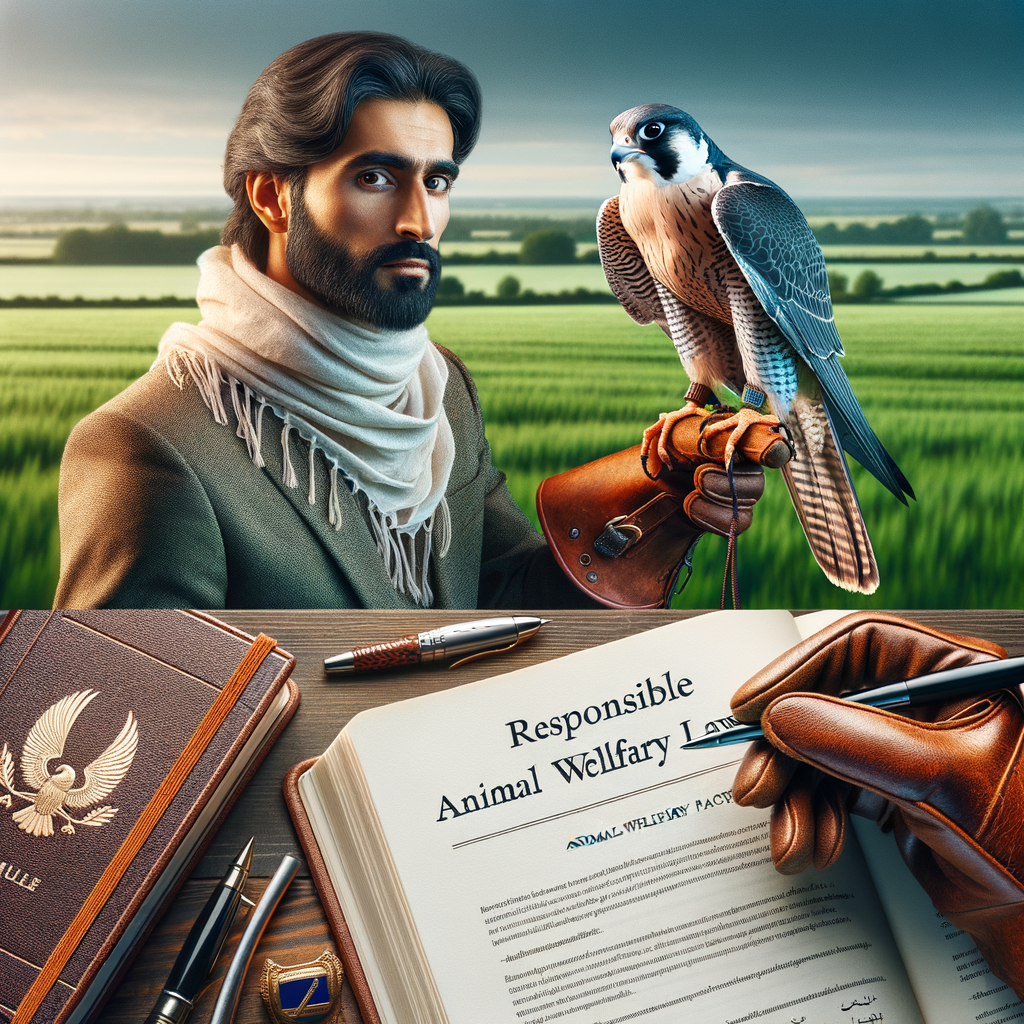Key Guidelines for Falconry Animal Welfare Laws
- Understanding Regulations: Falconry has strict rules to ensure the well-being of birds.
- Licensing Requirements: Falconers must have proper licenses and permits.
- Training Standards: There are specific training standards to ensure safe bird handling.
- Housing Conditions: Birds must be kept in clean, spacious, and safe environments.
- Health Monitoring: Regular health checks are essential for birds’ well-being.
- Diet and Nutrition: Ensuring birds receive a balanced diet is crucial.
- Conservation Efforts: Falconry plays a role in conservation and species protection.
- Ethical Hunting Practices: Ethical practices in hunting are mandated to protect wildlife.
- Transport Rules: There are rules for safely transporting birds.
Adhering to these guidelines helps protect these magnificent birds and allows the tradition of falconry to continue responsibly.
Ensuring Welfare in Falconry: Why Every Law Matters
Imagine you’re strolling through the lush, green countryside of Ireland, where every stone wall and rolling hill tells a story. Just like the care and love that goes into tending an Irish family farm, where each sheep and cow is part of the family, the world of falconry demands the same deep respect and careful attention to the welfare of the magnificent birds.
At Learn Falconry, we believe that understanding and following animal welfare laws is the cornerstone of responsible falconry. These laws aren’t just rules; they’re a way to ensure that these noble birds thrive and flourish under our care.
So why should you keep reading? Well, think of it like learning the secrets of a well-tended Irish garden. The magic lies in knowing how to blend tradition with responsibility, and getting it right makes all the difference. Dive into this article to discover how we at Learn Falconry uphold the highest standards, ensuring a harmonious and respectful relationship between humans and these incredible birds. The better we understand the laws, the more we can enjoy the beautiful dance of falconry, where trust and respect soar high.
Understanding Animal Welfare Laws in Falconry
Falconry is an ancient practice where humans train birds of prey, such as falcons, to hunt in cooperation with them. While falconry is fascinating and a testament to our bond with nature, it is essential to ensure that it is conducted ethically and in line with animal welfare laws. In this article, we will delve into the importance of animal welfare in falconry, the ethics behind it, and how animal rights intersect with this practice.
Animal Welfare Falconry
Animal welfare refers to the well-being of animals under human care. In falconry, this means providing proper nutrition, comfortable housing, and veterinary care for the birds. Ensuring the welfare of falcons and other birds of prey is not only a moral duty but also a legal requirement in many places.
Laws are in place to protect these magnificent creatures from mistreatment. Falconers must comply with strict regulations that outline how to care for and handle falcons. For more information on the basic health care for falcons, explore our Falcon Health and Nutrition section.
Falconry Ethics
The practice of falconry is guided by a set of ethics, which are principles that dictate how humans should interact with their birds. These principles include treating the birds with respect, ensuring they live in suitable environments, and training them without causing undue stress or harm. Ethical falconry practices are vital to maintaining the tradition of falconry in a manner that respects these incredible birds.
For a deeper understanding of the ethical considerations in falconry, including best practices and guidelines for falconers, visit our Ethical Falconry section.
Animal Rights and Falconry
Animal rights are fundamentally about ensuring that animals are treated as sentient beings with interests that need to be respected. In falconry, this means acknowledging that birds of prey have natural behaviors and needs that must be met, even while under human care.
Legal frameworks across the globe have included provisions specifically for the protection of birds used in falconry. These laws make sure that the birds are not exploited and that their well-being is prioritized. To get more insight into these regulations, you can check out our Legal Aspects of Falconry page.
Falconry Equipment and Its Role in Welfare
The equipment used in falconry, such as hoods, jesses, and leashes, plays a crucial role in the welfare of the birds. Proper equipment ensures that the birds are safe and comfortable during training and hunting sessions. It is important to use well-maintained and appropriately fitted equipment to prevent injuries. For more detailed information on the tools and equipment used in falconry, you can explore our extensive Falconry Equipment guide.
Training in Falconry
Training is a significant part of falconry, and it must be done with a focus on the bird’s welfare and ethical practices. Training methods should be humane and based on positive reinforcement to encourage the natural behaviors of the birds. For beginners, understanding these training principles is crucial. You can start learning about basic training techniques by visiting our Training a Falcon page.
Legal Aspects and Compliance
Falconry is regulated by various laws that aim to protect both the birds and the environment. These regulations cover everything from obtaining licenses and permits to the welfare of the birds and hunting regulations. Compliance with these laws is mandatory for ethical falconry practice. For more detailed information on the legal requirements, you can refer to our Legal Aspects of Falconry section.
By understanding and adhering to animal welfare laws and ethical guidelines, falconers can ensure that their practice not only respects the birds they work with but also preserves the long-standing tradition of falconry for future generations.
Falconry and Animal Welfare
Falconry is the art of training birds of prey to hunt and return to their handlers. However, this sport comes with a significant responsibility for the welfare of the animals involved. Let’s explore some of the key aspects of animal welfare in falconry.
Ethical Considerations in Falconry
- Meet Demands and Avoid Damage: This concept evaluates whether a bird can fulfill its needs and avoid harm. Experts consider a bird’s physiological, morphological, and behavioral traits to ensure its well-being.
- Behavioral Health: Interestingly, falconry birds usually don’t show disturbed behaviors like stereotypies, which are repetitive, non-natural behaviors often seen in stressed animals. This indicates that well-kept falconry birds might experience less stress than other captive animals.
Conservation and Education Efforts
Falconers have greatly contributed to wildlife conservation and education:
- Conservation Initiatives: Many falconers engage in captive breeding programs, educational outreach, and wildlife rehabilitation efforts. These activities help maintain healthy populations of birds of prey and their habitats.
- Scientific Contributions: Falcons and other raptors kept by falconers have been instrumental in research on animal behavior and reproductive biology.
Regulatory Frameworks
Different regions have various regulations to ensure the welfare of falconry birds:
- United States: Falconry is not included under the Animal Welfare Act, but there are ongoing discussions to address regulatory concerns and improve the sport.
- New York State: The Department of Environmental Conservation (DEC) oversees falconry licenses. Requirements include exams, bird care, and training standards to ensure proper treatment.
Key Statistics
| Topic | Details |
|---|---|
| Behavioral Health | Disturbed behaviors not seen in falconry birds |
| Conservation Efforts | Falconers involved in captive breeding and education |
| US Regulations | Not covered under Animal Welfare Act |
| New York State | DEC requires exams and care standards for falconry licenses |
| Ethical Evaluation | “Meet Demands and Avoid Damage” concept used |
Care and Health of Falcons
Falconers must ensure the proper care and health of their birds:
- Daily Care: Regular feeding, medical check-ups, and proper housing are essential. Birds not receiving adequate care may be seized, and owners can lose their licenses.
- Training Methods: Although some methods, like food motivation, are controversial, they are scrutinized to ensure they don’t harm the birds.
Falconry Licenses and New Regulations
New laws aim to enhance the welfare of birds in falconry:
- USDA Regulations: By 2024, new regulations will require humane handling, care, treatment, and transportation of birds as per the Animal Welfare Act.
- License Requirements: Prospective falconers must pass exams and meet specific care standards, which helps in maintaining high welfare standards for the birds.
Visual Aid: Falconry Regulations
| Region | Key Requirements |
|---|---|
| New York State | Exams, care standards, and proper training |
| United States | New USDA regulations effective February 21, 2024 |
Conservation and Animal Welfare Foundations
Organizations like the European Foundation for Falconry & Conservation (EFFC) promote:
- Sustainable Hunting: Encouraging methods that are environmentally friendly.
- Cultural Initiatives: Preserving the tradition of falconry while stressing animal welfare.
Falconry, when practiced responsibly, can be an intersection of tradition, sport, and conservation, playing a crucial role in maintaining healthy raptor populations and educating the public about wildlife.
Ensuring Animal Welfare in the Practice of Falconry
In 2024, the practice of falconry is carefully monitored and highly regulated to ensure the welfare of the birds involved. Falconry, considered an ecologically suitable hunting method, has shown to cause low stress to quarry animals and significantly contributes to scientific research. Ethical considerations, such as the “Meet Demands and Avoid Damage” concept, underline the importance of proper care for the birds used in falconry, ensuring their physiological and behavioral needs are met.
Falconers play a vital role in wildlife conservation by participating in the rehabilitation of raptors and actively contributing to scientific and veterinary advancements. Regulatory measures, such as those implemented by the USDA in the United States, enforce standards for the humane handling, care, and transportation of these magnificent birds, further highlighting the importance of their well-being.
Public perceptions of falconry vary, with some viewing it as an entertaining yet educational sport, while others express concerns about the ethical treatment of birds in captivity. Despite this, the commitment to maintaining stringent guidelines and promoting humane treatment is clear.
Overall, the efforts to balance falconry traditions with modern ethical standards ensure that the welfare of birds used in falconry remains a top priority, reflecting a harmonious blend of tradition, conservation, and responsibility.



